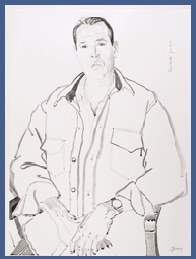 |

 onette lead a closeted life until well into his twenties. This meant his literary output was closeted as well, although several poems express his desire to be more uninhibited, a trait he associated with the men on whom he had crushes, most of them straight. An unpublished 1967 poem is "For Bill," probably Bill Hilgendorf, his fellow Elihu member at Yale and boyfriend of Star Black. It begins: "What gave away so much of us to us?" He adds to and alters this line for meaning and flow but almost unconsciously leaves in the sense of having something to hide. onette lead a closeted life until well into his twenties. This meant his literary output was closeted as well, although several poems express his desire to be more uninhibited, a trait he associated with the men on whom he had crushes, most of them straight. An unpublished 1967 poem is "For Bill," probably Bill Hilgendorf, his fellow Elihu member at Yale and boyfriend of Star Black. It begins: "What gave away so much of us to us?" He adds to and alters this line for meaning and flow but almost unconsciously leaves in the sense of having something to hide.
Several early poems have protagonists who are barely disguised masks of his desire. "Drifter" depicts an uninhibited young man, and the poet admonishes the reader:
.Do not
die in this firm house. Leave, give chase,
the troubadours and traveling men survive.
Lines of another poem give even more of a sense of things hidden, things misrepresented. In this 1970s poem, he does seem ready to acknowledge the pain of the closet's deceptions, even if he is not completely aware of the cause:
October's just October, its twilight feel,
its way of dying out something to invent.
When I am with my friends, I can describe
leaves piling like anybody: I've hid my losses
in those brief lies.
Monette's early work received good distribution for a beginning
poet, with selections published in The Yale Lit and in privately
published volumes. A friend issued the poems inspired by Walden in
a small chapbook, Come Spring, closeted work that was another
inkling of coming out yet to occur, both for the poet and his subject,
when in later years critics would name Thoreau as "gay."
Sarah (1970) was published with illustrations by David Schorr,
one of Monette's earliest and longest-lasting friends. It was reviewed
in his hometown newspaper with a featured photograph of the poet:
"The poet is young and can hold a fascinating conversation on the
character of art in the twentieth century and digs what he's doing
with his life." The article gives quotes about a novel he has been
working on and even a screenplay "which may be sold soon."
Monette
visited San Juan, Puerto Rico, setting two poems there. The unpublished
poem refers to women tourists "at the Caribe Hilton." The poem also
suggests the feeling of being in the closet, a Cavafy-like expression
that one can't change or hide one's true nature even though changing
cities or traveling:Above them the palms shake like
shredded bells.
Even here
they will always be what
they always are .
During these
years, he made friendships with several east coast gay men who were
or would soon become prominent writers and poets, such as Richard
Howard, J.D. (Sandy) McClatchy, and Sanford Freidman. Through McClatchy
he was introduced to the older gay poet James Merrill in a meeting
which didn't take. McClatchy has recorded the differences in temperament
that would propel Monette away from the "east coast" poetry all the
way across the country to Los Angeles and a different kind of writing
altogether.
Richard Howard wrote Monette after The Looker-On: Fra Angelico,
Crucifixion, About 1450 was published around 1973 as a chapbook.
Howard gives praise and then criticism: "Focus, my dear, is not, here,
your strong point .."
Monette's early poems were collected by the Boston publisher Little,
Brown in 1975 and published as The Carpenter in the Asylum.
He had arrived as a poet.

|
|

Poem written at Yale
Poem written after visiting San Juan, Puerto Rico
Monette's
chapbook poem, The Looker-On
Review
of Monette's Sarah
Monette teaching at Cheshire Academy
|

![]()
![]()
![]()
![]()

 onette lead a closeted life until well into his twenties. This meant his literary output was closeted as well, although several poems express his desire to be more uninhibited, a trait he associated with the men on whom he had crushes, most of them straight. An unpublished 1967 poem is "For Bill," probably Bill Hilgendorf, his fellow Elihu member at Yale and boyfriend of Star Black. It begins: "What gave away so much of us to us?" He adds to and alters this line for meaning and flow but almost unconsciously leaves in the sense of having something to hide.
onette lead a closeted life until well into his twenties. This meant his literary output was closeted as well, although several poems express his desire to be more uninhibited, a trait he associated with the men on whom he had crushes, most of them straight. An unpublished 1967 poem is "For Bill," probably Bill Hilgendorf, his fellow Elihu member at Yale and boyfriend of Star Black. It begins: "What gave away so much of us to us?" He adds to and alters this line for meaning and flow but almost unconsciously leaves in the sense of having something to hide.